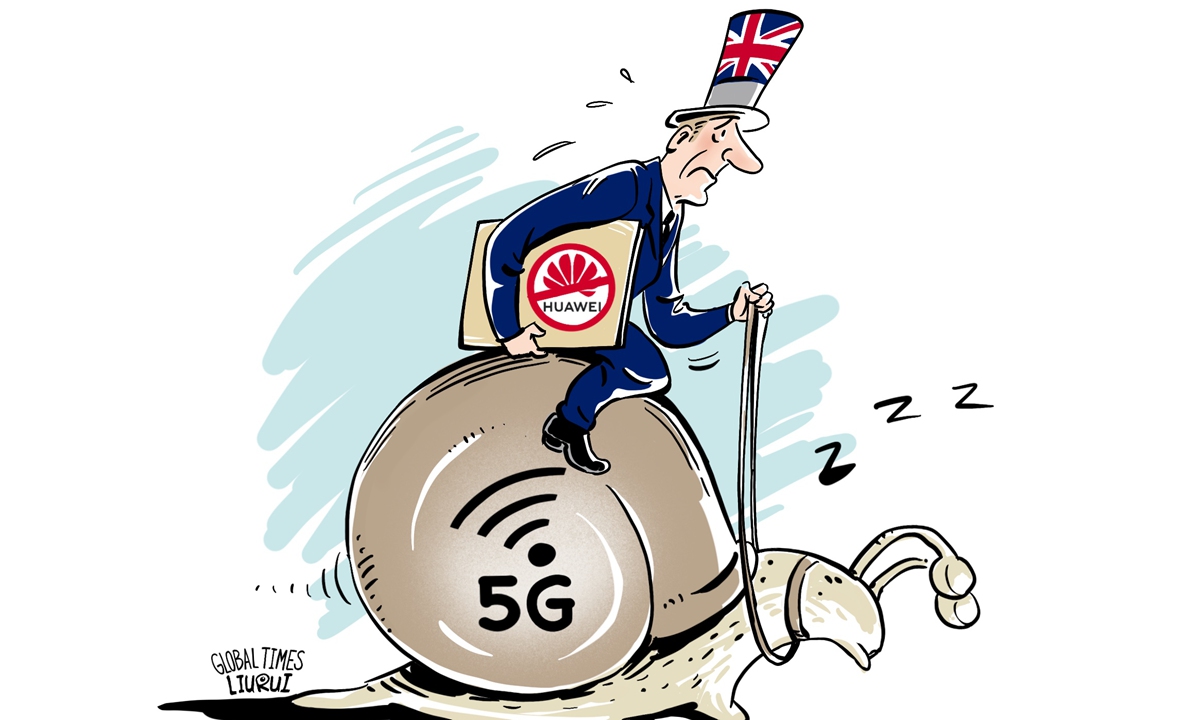
Illustration: Liu Rui/GT
Recent studies found that the UK now has the least effective 5G rollout in the G7 group of advanced economies, and London lags behind rest of Europe when it comes to 5G network quality. This comes despite the government having made an electoral manifesto pledge to make gigabit broadband available to 85 percent of the UK by 2025 and nationwide by 2030. It further pledged £5 billion to achieve these results.However, by the end of 2020, the government U-turned on its policy due to pressure from the US to dump Huawei from its 5G networks as part of pushing an anti-China agenda on dubious security concerns.
A report from The Times last year describes the Trump administration's deputy national security advisor, Matthew Pottinger, one of the architects of the anti-China agenda, as "having yelled at the British cabinet for five hours" to demand they change course on the Chinese telecommunications company. Despite not being in line with the government's pledge, going against national interests, and a security review having found no risks in Huawei's participation, the British government ultimately caved in and made a decision which has since been proved as counterproductive, expensive and "cutting one's nose off to spite their face."
It's no surprise that the UK is falling behind in the 5G race, not just in G7 but also worldwide. As a study by OpenSignal shows, the UK ranks an abysmal 39th out of 56 countries (both developing and developed) on 5G rollout and is well and truly in the "slow lane." The Financial Times citing Ofcom, the telecoms regulator, as saying in May that 5G mobile coverage from at least one operator was available at 82 percent of places where people live and work in the UK, but the figure falls to 22 percent for areas covered by all network providers.
On a personal level, internet speeds are slow and home broadband operators are often prone to receiving service outages and extreme levels of disruption. Even just a few weeks ago our home internet was down for days because the infrastructure in the local area had been damaged.
In contrast, despite being a much larger country, and not long ago far behind in economic development compared with Britain, China has established the largest and most comprehensive 5G rollout in the world. In China, not only is internet connectivity readily available, but it is also fast and reliable. In fact, China's whole manner of digitalisation and digital economy is far more advanced than that of Britain. This makes visiting Britain feel like you are going back in time. The facilitation of widespread electronic and digital infrastructure has been a masterclass of China's own economic development, which enables everything from a QR code culture to widespread online shopping opportunities and communications.
In having removed Huawei, the UK's 5G rollout has been setback years at an estimated cost of £18.2 billion to GDP. The decision has also come at an additional £2 billion to network providers to replace the equipment by the deadline of 2027. The subsequent delay to 5G rollout this decision caused, combined with the narrowing of the market which has driven up prices, now mean that an additional £34 billion is required in order to truly meet the demand for it by new technologies and industries. The UK government, however, is not willing to invest that much as the British economy is struggling across the board.
Meanwhile, countries who did not make this decision are powering ahead in 5G technology. For example, as quoted by Mobile Magazine, Spanish telecommunications company Telefónica, who went with Huawei, "stated that 90% of the country's population will have access to 5G by 2022. The organization already provides 5G services to 80% of Spain's population, available in 1,300 towns and cities across the country." In addition, some developing countries outside of Europe are now even able to move beyond 5G thanks to Huawei's role, such as the Philippines, a country which is far poorer than the UK and with a much larger population.
All of this has seen the UK government ultimately fail on its pledge to "level up" the UK through broadband and internet connectivity, with rural areas being left behind and urban areas also in the slow lane. Instead of making Britain more economically competitive and "global," they have U-turned, underwhelmed and subsequently undermined Britain's technological development through succumbing to foreign pressure. Rather than high-tech connectivity, the situation is once again a case of "will the last one to leave Britain please turn out the lights?"
The author is a political and historical relations analyst. opinion@globaltimes.com.cn


